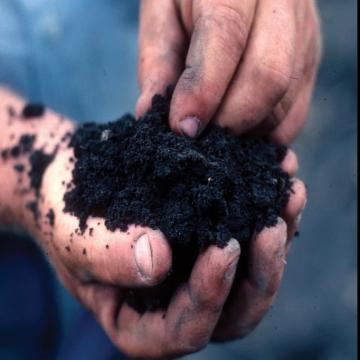I remember hearing from my mom, who was a Master Gardener: You don't feed plants; you add to the soil anything that is missing. The plants will take what they need as long as it is present. Often, you hear about the three essential nutrients nitrogen, potassium, and phosphorus, NPK, as well as PH, which measure acidity. While these are important to plant health, other soil components are just as important. Other micronutrients are essential to plant health. There are also microbes in healthy soil that help break down organic matter and compounds so the plants can take them up.
Healthy soil is critical to creating a successful garden. A healthy soil ecosystem is essential for providing nutrients, proper drainage, and a thriving environment for plant growth. Building and maintaining healthy soil is vital to cultivating vibrant plants and achieving bountiful harvests. This article covers the basics for building healthy soil.
Know Your Soil Type
Before amending your soil, it's crucial to determine its type:
- Clay Soil: Heavy and dense, with poor drainage.
- Sandy Soil: Light and loose, drains quickly, but lacks nutrients.
- Loamy Soil: Ideal balance of sand, silt, and clay, retains moisture and nutrients well.
Test Soil Quality
Adding fertilizers and soil amendments requires knowing the soil's current condition to avoid more problems. Conducting a soil test before blindly adding fertilizers to your garden is important. Too much of certain nutrients can do more harm than good. Testing the soil will help you choose the correct amendments to address specific deficiencies.
Home Test Kits: You can perform a soil test at home with one of the kits available at garden centers and online. The results are less accurate than a professional test but can be a guideline when adding nutrients.
Professional Soil Test: If you want an accurate test, you can take one or more samples and send them for testing. The cost can be up to $100. Some Master Gardener groups offer soil tests for as low as $10, depending on where you live. Check with your local Master Gardeners association for costs and proper sample preparation.
Add Organic Matter
Organic matter improves soil structure, nutrient content, and moisture retention. Some organic matter sources are
- Compost: Rich in nutrients, enhances microbial activity.
- Manure: Adds nitrogen, phosphorus, and potassium (N-P-K).
- Mulch: Reduces erosion, regulates soil temperature, and retains moisture.
Foster Soil Health
Encourage beneficial organisms and processes:
- Crop Rotation: Prevents nutrient depletion and reduces pests.
- Cover Cropping: Adds organic matter and fixes nitrogen.
- No-Till Gardening: Minimizes soil disturbance and preserves microbial life.
Avoid Soil Compaction
Limit walking or working in wet soil to prevent compaction, which hinders root growth and reduces oxygen availability.
Use Natural Fertilizers
Organic fertilizers usually have a lower concentration of the three essential nutrients, which can often be good as it is harder to over-fertilize and cause a burn. Be aware, however, that many organic fertilizers are not readily available for plants to take up. Many organic fertilizers need to be broken down by microbes in the soil. This is why we add them throughout the year, including in the fall when we put the garden to bed.
Practice Water Conservation
Maintain proper moisture levels:
- Mulching: Reduces evaporation and conserves water.
- Drip Irrigation: Directs water to plant roots efficiently.
Monitor and Adjust
Assess soil moisture, plant health, and nutrient needs regularly. Adjust amendments and practices as necessary throughout the growing season.
Year-Round Care
- Soil Amendments: Continue to replenish organic matter and adjust pH as needed.
- Winter Cover Crops: Protects soil structure and adds nutrients during dormant periods.
By following these practices, you can cultivate and maintain healthy soil in your home garden, promoting robust plant growth, improved yields, and long-term sustainability.
Nurturing your soil ensures a fruitful and enjoyable gardening experience year after year, whether you're growing vegetables, flowers, or herbs.

